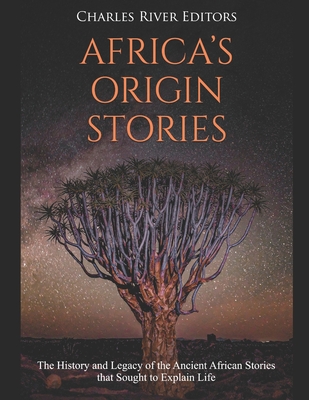Africa's Origin Stories: The History and Legacy of the Ancient African Stories that Sought to Explain Life

Africa's Origin Stories: The History and Legacy of the Ancient African Stories that Sought to Explain Life
*Includes pictures
*Includes a bibliography for further reading
By the dawn of the 17th century, Portuguese influence in Africa fell into decline, and the occasions of European contact with Ethiopia became very few and far between. It would be another three centuries before another European would venture into the holy precincts of Lalibela as part of a British military expedition mounted in 1867. Thus, the "rediscovery" of the remarkable churches and the story of Christianity in Ethiopia would only be recently written.
As that indicates, the modern history of Africa was, until very recently, written on behalf of the indigenous races by the white man, who had forcefully entered the continent during a particularly hubristic and dynamic phase of European history. When they began to arrive in sub-Saharan Africa in the early 16th century, Christian missionaries replaced established animist practices with the tenets of Christianity. This was particularly true for the Catholics who offered a faith promising eternal paradise upon the simple confession of sin. In an age of slavery, disease, and inter-tribal warfare when life was unembellished, brutal, and usually short, this was a particularly seductive message. Add to this the ritual inherent in Catholic worship, the drinking of blood and the eating of flesh, and the susceptibilities of a society defined by elaborate religious rituals, and the conversion succeeded with extraordinary ease.
It is also true that the Catholic spiritual hierarchy reflected the structure of African spiritual life. The first line of African worship is composed of the spirits of passed ancestors whose relationship with the living remains direct and active. This overlapped with the idea of a host of saints endowed with specific functions and responsibilities. At a higher level, the more remote ancestral spirits, those of more than three or four generations past who have merged into the overall spirit of the nation, formed a less definable but powerful presence in day to day life. These spirits easily translate to angels, while the almighty creator, too vast and remote to be understood, conforms to the notion of the one God. The embrace of Christianity and Islam, even today, is not necessarily to the exclusion of ancestral spirits, nor the essentials of witchcraft and sorcery. The precarious security of albino people in east and central Africa, whose body parts are sought after in traditional "medicine," is testimony to the
PRP: 86.34 Lei
Acesta este Prețul Recomandat de Producător. Prețul de vânzare al produsului este afișat mai jos.
77.71Lei
77.71Lei
86.34 LeiLivrare in 2-4 saptamani
Descrierea produsului
*Includes pictures
*Includes a bibliography for further reading
By the dawn of the 17th century, Portuguese influence in Africa fell into decline, and the occasions of European contact with Ethiopia became very few and far between. It would be another three centuries before another European would venture into the holy precincts of Lalibela as part of a British military expedition mounted in 1867. Thus, the "rediscovery" of the remarkable churches and the story of Christianity in Ethiopia would only be recently written.
As that indicates, the modern history of Africa was, until very recently, written on behalf of the indigenous races by the white man, who had forcefully entered the continent during a particularly hubristic and dynamic phase of European history. When they began to arrive in sub-Saharan Africa in the early 16th century, Christian missionaries replaced established animist practices with the tenets of Christianity. This was particularly true for the Catholics who offered a faith promising eternal paradise upon the simple confession of sin. In an age of slavery, disease, and inter-tribal warfare when life was unembellished, brutal, and usually short, this was a particularly seductive message. Add to this the ritual inherent in Catholic worship, the drinking of blood and the eating of flesh, and the susceptibilities of a society defined by elaborate religious rituals, and the conversion succeeded with extraordinary ease.
It is also true that the Catholic spiritual hierarchy reflected the structure of African spiritual life. The first line of African worship is composed of the spirits of passed ancestors whose relationship with the living remains direct and active. This overlapped with the idea of a host of saints endowed with specific functions and responsibilities. At a higher level, the more remote ancestral spirits, those of more than three or four generations past who have merged into the overall spirit of the nation, formed a less definable but powerful presence in day to day life. These spirits easily translate to angels, while the almighty creator, too vast and remote to be understood, conforms to the notion of the one God. The embrace of Christianity and Islam, even today, is not necessarily to the exclusion of ancestral spirits, nor the essentials of witchcraft and sorcery. The precarious security of albino people in east and central Africa, whose body parts are sought after in traditional "medicine," is testimony to the
Detaliile produsului













